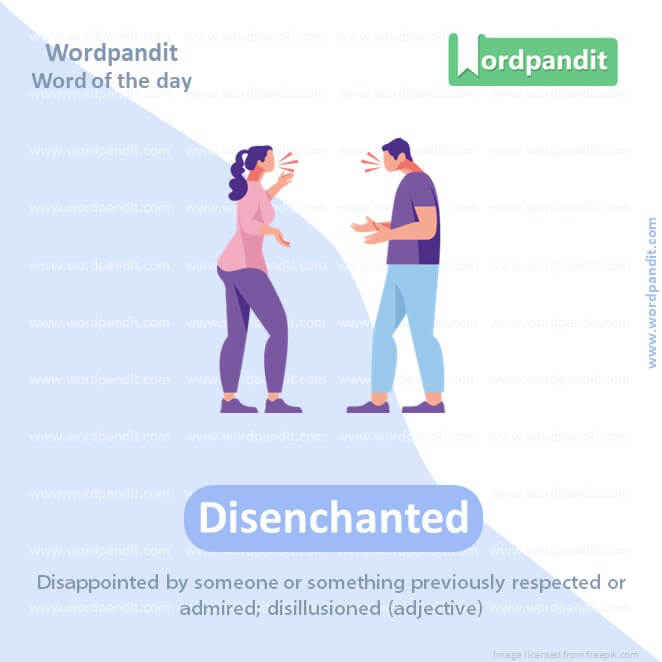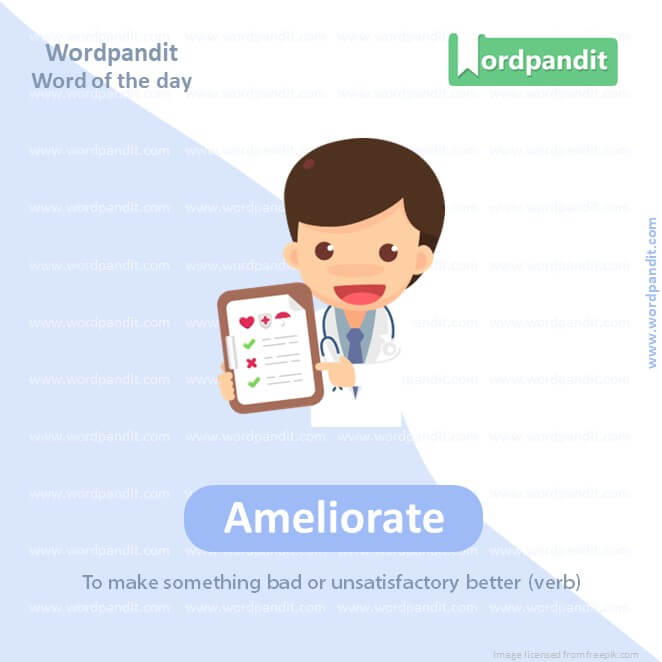Daily Vocabulary Words: List of Daily Used Words in Leading International Newspapers
Hi there. Welcome to this special section @ Wordpandit.
Our endeavour here is very simple: to highlight important daily vocabulary words, which you would come across in leading newspapers in the country. We have included the following newspapers in our selection:
• The New York Times
• The Washington Post
• Scientific American
• BBC
• The Guardian
• Psychology Today
• Wall Street Journal
• The Economist
We are putting in extensive work for developing your vocabulary. All you have got to do is be regular with this section and check out this post on a daily basis. This is your repository of words that are commonly used and essentially, we are posting a list of daily used words. Hence, this has significant practical application as it teaches you words that are used commonly in leading publications mentioned above.
Visit the website daily to learn words from leading international newspapers.

WORD-1: Disenchanted
CONTEXT: Without local polls to fight, there will also be less incentive for any activists disenchanted with the leadership (committed Boris Johnson supporters, for example) to go out and pound the pavements for Sunak.
SOURCE: Guardian
EXPLANATORY PARAGRAPH: Disenchanted is like feeling disappointed because something is not as good as you thought it would be. It’s like when you get a toy you really wanted, but then it’s not as fun as you expected.
MEANING: Disappointed by someone or something previously respected or admired; disillusioned (adjective).
PRONUNCIATION: dis-en-chan-tid
SYNONYMS: Disillusioned, Disappointed, Discontented, Dissatisfied, Unimpressed
USAGE EXAMPLES:
1. She became disenchanted with her job.
2. The voters are disenchanted with the political process.
3. He grew disenchanted with his once favorite sport.
4. The disenchanted audience left the show early.

WORD-2: Acquaintances
CONTEXT: My friends and acquaintances are protesting, demanding that the capital’s budget be directed not to the repaving of roads, but towards the purchase of drones and FPVs for the battlefield.
SOURCE: Guardian
EXPLANATORY PARAGRAPH: Acquaintances are people you know, but they are not your close friends. It’s like kids you see at school and say hi to, but don’t play with a lot.
MEANING: People one knows slightly, but who are not close friends (noun).
PRONUNCIATION: uh-kwayn-tuhns-es
SYNONYMS: Contacts, Associates, Connections, Companions, Colleagues
USAGE EXAMPLES:
1. I have several acquaintances at the gym.
2. They were merely acquaintances, not friends.
3. She ran into an old acquaintance from college.
4. Networking events are great for making new acquaintances.
WORD-3: Attritional
CONTEXT: And going long has lots of downsides: attritional wear on the Conservative campaign machine, more time for the cost of living to bite, the challenge of getting under-motivated supporters to the polls when it’s cold and dark in the evening.
SOURCE: Guardian
EXPLANATORY PARAGRAPH: Attritional is like when something slowly gets weaker or less because of constant stress or pressure. It’s like when a toy breaks a little bit more each time it’s used roughly.
MEANING: Causing weakening or reduction through sustained attack or pressure (adjective).
PRONUNCIATION: uh-trih-shuh-nuhl
SYNONYMS: Erosive, Weakening, Wearing, Depleting, Grinding
USAGE EXAMPLES:
1. The war became a long, attritional battle.
2. They suffered heavy losses in the attritional conflict.
3. The attritional nature of the negotiations wore everyone down.
4. The company faced attritional competition in the market.
WORD-4: Delegitimize
CONTEXT: a former president trying to appeal to white nationalists with Hitlerian language (“vermin”) or far-left activists trying to delegitimize Israel, people will seek to capitalize, sow dissent and push narratives they favor (e.g., authoritarianism) by referencing myths and stereotypes many harbor against Jews.
SOURCE: Washington Post
EXPLANATORY PARAGRAPH: Delegitimize is like making something seem not correct or not acceptable. It’s like when someone says a rule in a game isn’t fair, so it shouldn’t be used.
MEANING: To diminish or destroy the legitimacy, credibility, or authority of something (verb).
PRONUNCIATION: dee-luh-jit-uh-myz
SYNONYMS: Discredit, Undermine, Invalidate, Disprove, Denounce
USAGE EXAMPLES:
1. The scandal served to delegitimize the government’s authority.
2. They attempted to delegitimize the opposing viewpoint.
3. His actions were seen as an effort to delegitimize the election results.
4. The article tried to delegitimize the study’s findings.

WORD-5: Stashed
CONTEXT: the gold bars and envelopes fat with cash stashed around his house are not a good look.
SOURCE: New York Times
EXPLANATORY PARAGRAPH: Stashed is like hiding something away in a secret place. It’s like when you hide your favorite candy so no one else can find it.
MEANING: Stored something safely in a hidden or secret place (verb).
PRONUNCIATION: stashd
SYNONYMS: Hidden, Concealed, Stored, Secured, Tucked away
USAGE EXAMPLES:
1. She stashed her savings under the mattress.
2. He had stashed important documents in the safe.
3. The squirrel stashed nuts for the winter.
4. They stashed the stolen goods in an abandoned house.
WORD-6: Speculation
CONTEXT: The news that Jeremy Hunt will deliver next year’s budget on 6 March sparked a fresh round of speculation that Rishi Sunak may be intending a spring election.
SOURCE: Guardian
EXPLANATORY PARAGRAPH: Speculation is like guessing about something without having all the facts. It’s like trying to figure out what you got for your birthday before you open it.
MEANING: The forming of a theory or conjecture without firm evidence (noun).
PRONUNCIATION: spek-yuh-lay-shun
SYNONYMS: Conjecture, Guesswork, Hypothesis, Theorizing, Supposition
USAGE EXAMPLES:
1. There is much speculation about the cause of the fire.
2. The stock market is often driven by speculation.
3. His disappearance led to wild speculation in the media.
4. She dismissed the rumors as pure speculation.

WORD-7: Ameliorate
CONTEXT: it would encourage Conservative voters to the polls and help avoid, or at least ameliorate, the devastating loss of councillors that otherwise might result.
SOURCE: Guardian
EXPLANATORY PARAGRAPH: Ameliorate is like making something better or easier. It’s like helping someone who is sad feel a little happier.
MEANING: To make something bad or unsatisfactory better (verb).
PRONUNCIATION: uh-meel-yuh-rate
SYNONYMS: Improve, Enhance, Alleviate, Better, Mitigate
USAGE EXAMPLES:
1. The reform did much to ameliorate living conditions.
2. They took steps to ameliorate the environmental impact.
3. Efforts were made to ameliorate the situation.
4. Medication was used to ameliorate the pain.

WORD-8: Accuser
CONTEXT: she made clear that the accuser is subjecting Israel to a standard no other country must meet, which is the essence of antisemitism.
SOURCE: Washington Post
EXPLANATORY PARAGRAPH: An accuser is someone who says that another person did something wrong or bad. It’s like when a kid tells the teacher who made the mess.
MEANING: A person who claims that someone has done something wrong or illegal (noun).
PRONUNCIATION: uh-kyoo-zer
SYNONYMS: Complainant, Plaintiff, Prosecutor, Claimant, Litigant
USAGE EXAMPLES:
1. The accuser testified in court.
2. His accuser provided evidence of the wrongdoing.
3. She faced her accuser during the trial.
4. The accuser and the accused were both present.
WORD-9: Dissension
CONTEXT: Adversaries use it to sow dissension, weaken adversaries and justify aggression against their own people and other countries.
SOURCE: Washington Post
EXPLANATORY PARAGRAPH: Dissension is like when people disagree or argue about something. It’s like when two friends argue about which game to play.
MEANING: Disagreement that leads to discord (noun).
PRONUNCIATION: dih-sen-shun
SYNONYMS: Disagreement, Conflict, Dispute, Contention, Discord
USAGE EXAMPLES:
1. The decision caused dissension among the members.
2. They worked to resolve the dissension within the team.
3. The topic was a source of much dissension in the community.
4. Dissension within the group led to its breakup.
WORD-10: Steadying
CONTEXT: An autumn election would give him two years on the job, the first of which (one might argue) was spent steadying the ship after Liz Truss.
SOURCE: Guardian
EXPLANATORY PARAGRAPH: Steadying is like making something stable or keeping it from moving. It’s like holding onto a table to stop it from wobbling.
MEANING: Making something steady or stable; causing to become calm or under control (verb).
PRONUNCIATION: sted-ee-ing
SYNONYMS: Stabilizing, Balancing, Supporting, Securing, Anchoring
USAGE EXAMPLES:
1. She was steadying herself on the railing.
2. His presence had a steadying effect on the team.
3. He used a tripod for steadying the camera.
4. The pilot was steadying the aircraft during turbulence.
Vocabulary Daily Use
In the fascinating world of language learning, we often concentrate on taking giant leaps, but the real magic lies in the small steps of ‘vocabulary daily use’. These frequently used words and phrases form the backbone of practical communication and understanding. Therefore, mastering ‘vocabulary daily use’ is a crucial element in achieving language fluency.
To effectively learn ‘vocabulary daily use’, one needs to venture beyond the traditional textbook resources. The real essence of these words unveils itself in everyday exposure and interactions. Engaging with a variety of material like novels, magazines, newspapers, podcasts, films and digital content deepens the understanding of ‘vocabulary daily use’. Immersion in these contexts yield natural, everyday language that bridges the gap between the classroom and the real world.
The journey of mastering ‘vocabulary daily use’ necessitates the integration of innovative memory techniques. Flashcards and the Leitner System aid in embedding these words into your long-term memory by promoting active recall. Additionally, the use of mnemonic devices, which allow you to associate ‘vocabulary daily use’ with personal and familiar narratives, can enhance your ability to remember and recall these words.
Moreover, it’s important to remember that ‘vocabulary daily use’ isn’t just about comprehension- it’s about practice and active usage. Incorporate these words in your day-to-day communication and social interactions. This not only solidifies your understanding but also accelerates learning and internalization of ‘vocabulary daily use’.
In a nutshell, mastering ‘vocabulary daily use’ is a continual process that demands exposure, creative learning strategies and assertive practice. The commingling of these tactics brews the perfect formula that allows learners to seamlessly integrate ‘vocabulary daily use’ into their linguistic repertoire. And with that, they can navigate the nuances of language with confidence and ease.











